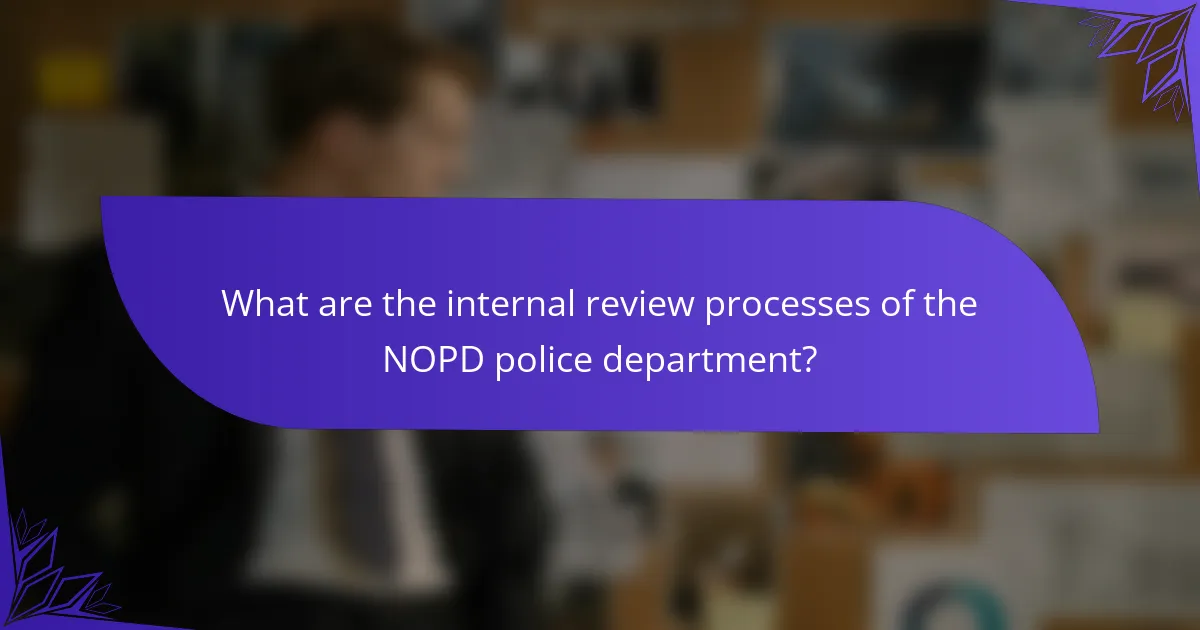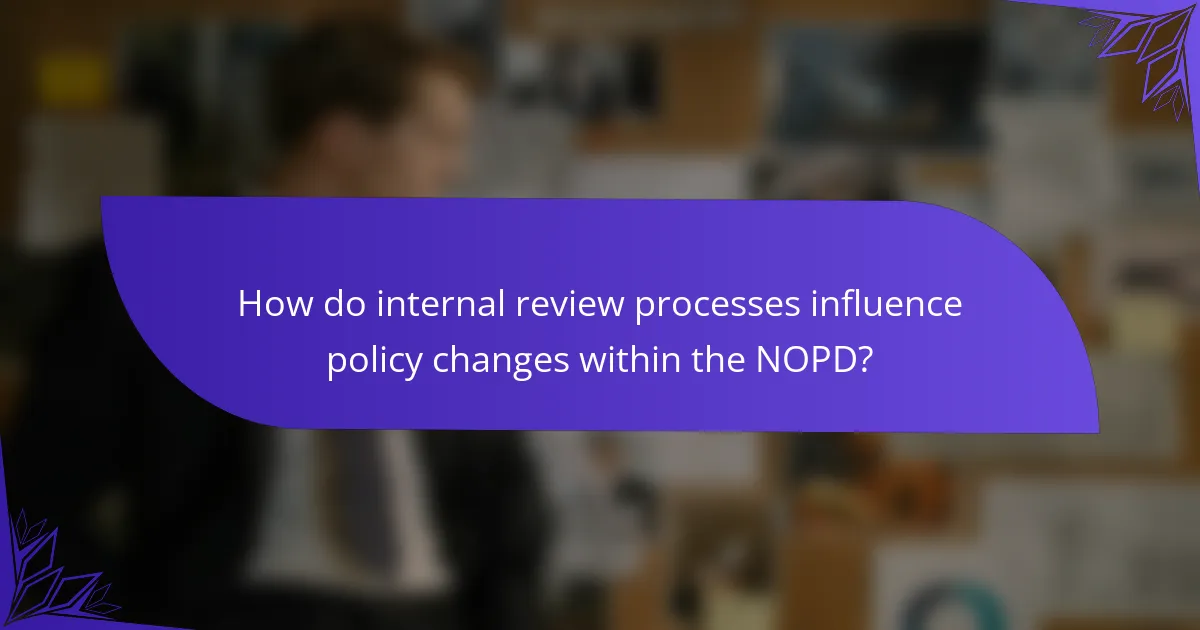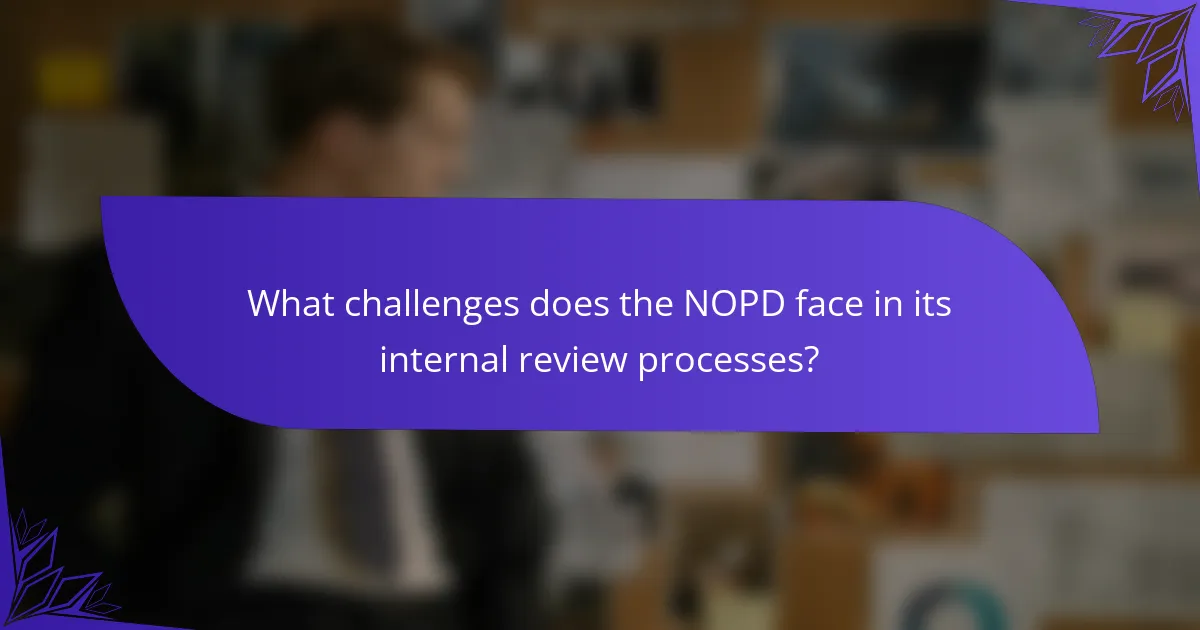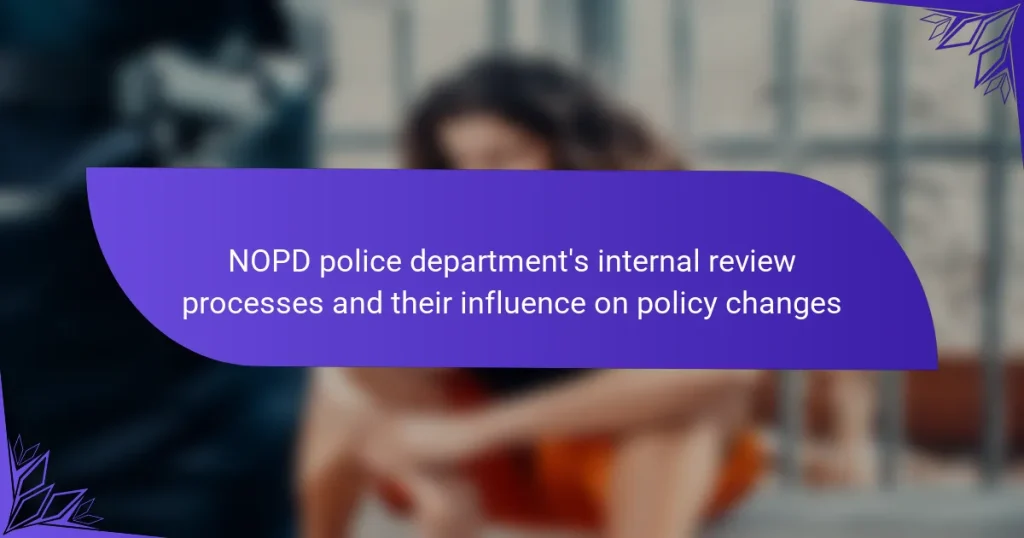
What are the internal review processes of the NOPD police department?
The internal review processes of the NOPD police department include several key components. These processes are designed to ensure accountability and transparency within the department. Firstly, the Internal Affairs Division investigates complaints against officers. This division handles allegations of misconduct or policy violations. Secondly, the NOPD conducts periodic audits and assessments of its operations. These audits help identify areas for improvement. Thirdly, the department utilizes a review board to evaluate critical incidents. This board assesses the appropriateness of officer actions during significant events. Additionally, community feedback is incorporated into the review processes. This engagement fosters trust between the NOPD and the public. Overall, these internal review processes aim to enhance the department’s effectiveness and uphold ethical standards.
How do these internal review processes function within the NOPD?
The internal review processes within the NOPD function as a systematic evaluation of police conduct and operations. These processes are designed to ensure accountability and transparency. They typically involve the examination of complaints against officers, use of force incidents, and adherence to departmental policies. Investigators within the NOPD assess evidence, interview witnesses, and review relevant documentation. Findings from these reviews can lead to disciplinary actions or policy revisions. The outcomes are documented and may inform training and operational improvements. This structured approach aims to enhance public trust and improve police-community relations.
What specific steps are involved in the NOPD’s internal review process?
The NOPD’s internal review process involves several specific steps. First, an incident is reported, which triggers the review. Next, the Internal Affairs Division conducts an investigation. This includes collecting evidence and interviewing witnesses. After the investigation, findings are documented in a report. The report is then reviewed by a supervisor for accuracy. Following this, the case is forwarded to the Chief of Police. The Chief makes a determination based on the findings. Finally, the outcome is communicated to relevant parties and may lead to policy recommendations. These steps ensure accountability and transparency within the department.
Who are the key personnel involved in these reviews?
The key personnel involved in the NOPD police department’s internal review processes include internal affairs investigators, supervisory officers, and the police chief. Internal affairs investigators are responsible for conducting thorough investigations of complaints against officers. Supervisory officers play a critical role in overseeing the review process and ensuring compliance with departmental policies. The police chief ultimately reviews findings and recommendations from these investigations. Additionally, external stakeholders may be involved, such as community representatives or oversight boards, to provide accountability. These personnel collectively influence policy changes based on the outcomes of the reviews and the need for improvements within the department.
What is the purpose of the NOPD’s internal review processes?
The purpose of the NOPD’s internal review processes is to ensure accountability and transparency within the department. These processes evaluate the conduct of officers and the effectiveness of policies. They aim to identify areas for improvement and ensure compliance with legal standards. Internal reviews help to maintain public trust in law enforcement. They also provide a mechanism for addressing complaints and misconduct. By analyzing incidents, the NOPD can implement necessary policy changes. This systematic approach contributes to better policing practices and community relations. Overall, internal reviews are essential for fostering a culture of integrity within the department.
Why are internal reviews important for police accountability?
Internal reviews are crucial for police accountability because they provide a systematic evaluation of police conduct. These reviews help identify misconduct and ensure adherence to policies. They foster transparency within the police department. Internal reviews can lead to corrective actions and policy reforms. For instance, a study from the National Institute of Justice found that regular internal assessments improve police-community relations. This process builds public trust and enhances the legitimacy of law enforcement agencies. Ultimately, internal reviews are vital for maintaining ethical standards and accountability in policing.
How do internal reviews impact officer conduct and community trust?
Internal reviews significantly impact officer conduct and community trust. These reviews establish accountability within the police department. They provide a structured process for evaluating officer behavior and decision-making. When officers know their actions are subject to review, they are more likely to adhere to protocols. This adherence can lead to improved conduct and professionalism.
Furthermore, transparent internal reviews foster community trust. When communities see that misconduct is addressed, they feel more secure. Studies show that departments with robust review processes have higher public confidence. For example, a 2016 study by the Police Executive Research Forum found that transparency in internal investigations enhances community perceptions of legitimacy.
Thus, internal reviews are crucial for promoting ethical behavior among officers and building trust with the community.

How do internal review processes influence policy changes within the NOPD?
Internal review processes within the NOPD significantly influence policy changes. These processes involve systematic evaluations of departmental practices and incidents. They aim to identify areas needing improvement or reform. Feedback from these reviews can lead to adjustments in operational procedures. For instance, findings may highlight the necessity for enhanced training protocols. Additionally, internal reviews can uncover trends that necessitate policy revisions. This structured approach ensures accountability and transparency within the department. Historical data shows that previous internal reviews have prompted substantial policy updates, reflecting their critical role in governance.
What types of policy changes have resulted from internal reviews?
Internal reviews at the NOPD have led to several types of policy changes. These changes often include adjustments to training protocols. Enhanced accountability measures are also a common outcome. Additionally, revisions to use-of-force policies have occurred. Changes to community engagement strategies have been implemented as well. Data from internal reviews indicate these policy shifts aim to improve public trust. The NOPD has documented these changes in their annual reports. These reports highlight the department’s commitment to transparency and reform.
Can you provide examples of significant policy changes influenced by reviews?
The NOPD has undergone significant policy changes influenced by internal reviews. One example is the implementation of new use-of-force policies. These changes were driven by findings from reviews highlighting excessive force incidents. Another significant change involved the adoption of community policing strategies. Reviews indicated a need for improved community relations and trust. Additionally, the NOPD revised its training protocols based on review outcomes. These revisions aimed to enhance officer training on de-escalation techniques. Collectively, these policy changes reflect the department’s response to internal review findings.
How do internal reviews identify areas for policy improvement?
Internal reviews identify areas for policy improvement by systematically evaluating existing policies and practices. These reviews assess compliance with regulations and effectiveness in achieving intended outcomes. They involve collecting data through audits, feedback, and performance metrics. Analysis of this data reveals gaps or inefficiencies in current policies. Stakeholder input during reviews offers diverse perspectives on policy impact. Identifying trends in incidents or complaints highlights specific areas needing attention. Recommendations from internal reviews guide decision-makers in formulating targeted policy changes. Historical data from previous reviews shows that such processes lead to measurable improvements in policy effectiveness.
What role does community feedback play in shaping NOPD policies?
Community feedback plays a crucial role in shaping NOPD policies. The New Orleans Police Department (NOPD) actively seeks input from residents to inform its policy decisions. This feedback is collected through community meetings, surveys, and public forums. The department analyzes this information to identify community concerns and priorities. Incorporating feedback helps the NOPD address issues such as police conduct and community relations. For instance, recent policy changes have been made in response to community demands for greater transparency and accountability. By engaging with the public, the NOPD aims to build trust and improve its service. This collaborative approach is essential for reflecting the community’s needs in law enforcement practices.
How does the NOPD gather community input during the review process?
The NOPD gathers community input during the review process through various methods. They conduct public forums to facilitate discussions with residents. Surveys are distributed to collect feedback on policing practices. The department also engages with community organizations to gather diverse perspectives. Additionally, NOPD has a dedicated email and hotline for residents to share their concerns. This multi-faceted approach ensures that community voices are heard and considered in policy reviews.
What impact does community feedback have on policy outcomes?
Community feedback significantly influences policy outcomes. It provides essential insights into public concerns and priorities. Policymakers often adjust strategies based on community input. This engagement fosters transparency and accountability. Research shows that policies reflecting community feedback lead to higher public satisfaction. For instance, a study by the Pew Research Center indicates that communities involved in feedback processes see improved trust in local law enforcement. Such trust enhances the effectiveness of policies implemented. Overall, community feedback shapes policies to better meet the needs of the population.

What challenges does the NOPD face in its internal review processes?
The NOPD faces several challenges in its internal review processes. One significant issue is a lack of transparency, which can undermine public trust. Additionally, there are concerns about bias within the review process. This bias may affect the objectivity of investigations. Insufficient resources also hinder thorough reviews. Limited personnel can lead to backlogs in cases. Furthermore, inadequate training for review board members can result in inconsistent evaluations. These challenges collectively impact the effectiveness of the NOPD’s internal review processes.
How do resource limitations affect the effectiveness of internal reviews?
Resource limitations significantly diminish the effectiveness of internal reviews. Insufficient personnel can lead to inadequate data collection and analysis. Limited financial resources restrict the ability to implement comprehensive review processes. This often results in rushed evaluations that overlook critical issues. Consequently, the quality of feedback provided is compromised. When reviews lack thoroughness, the potential for meaningful policy changes decreases. Historical data shows that departments with better funding report more effective internal reviews. In contrast, those with resource constraints struggle to maintain consistent oversight.
What are common obstacles encountered during the review process?
Common obstacles encountered during the review process include lack of transparency, insufficient data, and inadequate resources. Lack of transparency can hinder trust among stakeholders. Insufficient data may lead to incomplete assessments of incidents. Inadequate resources can slow down the review timeline. These barriers often result in delayed policy changes. Furthermore, organizational resistance to change can impede progress. Each of these obstacles significantly affects the effectiveness of the review process.
How does the NOPD address issues of bias in internal reviews?
The NOPD addresses issues of bias in internal reviews through comprehensive training and oversight. The department implements bias awareness training for all personnel involved in the review process. This training focuses on recognizing and mitigating implicit biases. Additionally, the NOPD employs a diverse review panel to ensure varied perspectives in evaluations. The department also utilizes data analysis to identify patterns of bias in internal reviews. Regular audits of review outcomes help to maintain accountability. By integrating community feedback, the NOPD enhances transparency in its review processes. These measures collectively aim to foster fairness and objectivity in internal evaluations.
What best practices can enhance the NOPD’s internal review processes?
Implementing standardized protocols can enhance the NOPD’s internal review processes. These protocols ensure consistency and transparency in investigations. Regular training for review personnel is crucial. It keeps them updated on best practices and legal standards. Utilizing technology can streamline data collection and analysis. This leads to more efficient reviews and quicker resolutions. Engaging community stakeholders fosters trust and accountability. Their input can guide policy improvements. Regular audits of the review process identify areas for enhancement. This promotes continuous improvement and adaptation to new challenges.
What strategies can be implemented to improve transparency and accountability?
Implementing regular audits and assessments can improve transparency and accountability. These audits should evaluate internal review processes and outcomes. Establishing clear reporting mechanisms increases public access to information. This allows citizens to understand police actions and decisions. Training officers on transparency practices fosters a culture of accountability. Engaging community stakeholders in policy discussions enhances trust and responsiveness. Publicly sharing data on police activities supports informed community engagement. Research indicates that departments with strong transparency measures experience higher public trust. For instance, the Police Executive Research Forum found that transparency initiatives correlate with reduced complaints against officers.
How can the NOPD ensure thoroughness in its review processes?
The NOPD can ensure thoroughness in its review processes by implementing standardized protocols for evaluations. These protocols should include clear guidelines for documentation and evidence collection. Regular training for review personnel is essential to maintain consistency in assessments. Incorporating independent oversight can add an additional layer of accountability. Utilizing data analytics can help identify patterns and areas needing improvement. Furthermore, engaging community feedback can enhance transparency and trust in the review process. Historical data shows that departments with rigorous review processes see a decrease in misconduct incidents, reinforcing the importance of thorough evaluations.
What resources are available for understanding the NOPD’s internal review processes?
The resources available for understanding the NOPD’s internal review processes include official NOPD documentation and public reports. The NOPD website contains policies, procedures, and guidelines related to internal reviews. Additionally, the Police Monitor’s Office provides oversight and publishes findings on internal review outcomes. Community organizations often analyze these processes and offer insights through reports. Academic studies and articles on police accountability also discuss NOPD practices. These resources collectively enhance understanding of the NOPD’s internal review mechanisms and their implications for policy changes.
The main entity of this article is the internal review processes of the New Orleans Police Department (NOPD) and their influence on policy changes. The article outlines the key components of these processes, including investigations by the Internal Affairs Division, periodic audits, and community feedback integration. It details the systematic evaluation of police conduct, the specific steps involved, and the roles of key personnel in ensuring accountability and transparency. Additionally, it highlights the importance of internal reviews for fostering public trust and discusses the challenges faced by the NOPD, as well as best practices for enhancing the effectiveness of these review processes.




